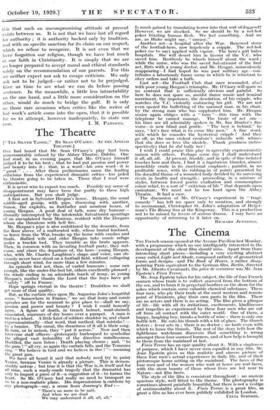The Cinema
THE French season opened at the Avenue Pavilion last Monday, with a programme which no one intelligently interested in the development of the silent film 'should miss. Apart from three interesting short pieces—including a 'very exciting abstract essay called Light and Shade, composed entirely of geometrical forms and designs—and The Book of Hours, a rather disap- pointing Paris equivalent to the German film, Berlin, directed by Mr. Alberto Cavalcanti, the piece de resistance was Mr. Jean Epstein's Finis Terrae. Mr. Jean Epstein takes for his subject, the life of four French seamen whose trade is to collect seaweed from the bottom of the sea, and to burn it in perpetual bonfires on the shore for the ashes which contain some valuable chemical substance. These four men, who ply their trade at the most western and remote point Of Finisterre, play their own parts in the film. There are no actors and there is no acting. The film gives a glimpse of life—life with all its irritations, excitements, kindlinesses and tragedies as experienced by these four men who are cut off from all contact with the outer world. One of them, a happy, laughing boy, breaks a bottle of wine : there is only one bottle left. He cuts his thumb with a bit of glass. The thumb festers ; fever sets in ; there is no doctor ; no knife even with which to lance the thumb. The rest of the story tells how the lighthouse watchman discovers that something is wrong amongst these four seaweed burners, and of how help is brought to them from the mainland at last.
Pints Terrae has an epic quality about it. With a singleness of purpose, which I have never seen equalled in any film, Mr. Jean Epstein gives us this realistic and sincere picture of these four men's actual experiences in daily life, and of their picturesque home setting on the mainland. The faces of the four men and of the women who wait at home are real faces, with the stern beauty of those whose lives are led near to Nature—not Alm faces. The style of the film is consistent throughout : an austere spacious style, well fitted to the theme. The photography is sometimes almost painfully beautiful, but there is not a vestige of sentimentality about it. Finis Terrae is a great film, as great a film as has ever been publicly exhibited m 1,midoh.
CELIA SIMPSON.






















































 Previous page
Previous page